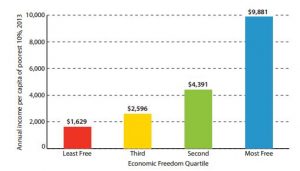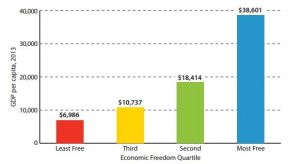
EspañolIt’s not a coincidence that the countries with the most economic freedom are more prosperous than those where economic freedom isn’t respected and investors can’t defend their own interests. Investment and wealth creation are fundamental for a society’s welfare.
Economic freedom is a deciding factor when doing business. That is why the places with more economic freedom offer a better quality of life to their citizens.
Economic freedom is fundamental to boost investment and accelerate growth in a country. Legal uncertainty; high taxes; lack of property rights for the poor; excessive regulations in labor and financial markets; these are obstacles for anyone looking to improve his quality of life since they weaken investors’ confidence, raising unemployment and poverty.
- Read More: Can America Become the Land of the Free, Home of the Brave again?
- Read More: Desiderata for Cuba: Embrace Freedom and Don’t Stand with Oppressors
Still, there seems to be a widespread ignorance of the importance of economic freedom. In Colombia, like in many other countries, people ask for more regulations on a daily basis. For instance, journalists and their readers celebrate corporate tax hikes because they wrongly assume that taking taking from the rich in order to give handouts to the poor is necessarily a good thing. They don’t realize that they are just slaying the goose that laid the golden eggs.
Very often, we also see powerful interest groups backed by well-meaning but ultimately naive people who protest so that the government raises tariffs in order to protect the “national economy.” Additionally, thousands of Colombians ask for greater subsidies, more state-owned companies, and a bigger state, all under the false assumption that these measures improve the people’s economic situation. They ignore that these are the causes of our relative poverty.
The Fraser Institute, understanding the importance of economic freedom for investment and a society’s welfare, has been publishing the “Index of Economic Freedom” since 1996 for 157 countries. This indicator is built using five variables described in the following table:
Areas and components of the Economic Liberty Index made by the Fraser Institute

This next graph shows that the income of the poorest 10% is much higher in countries with greater economic freedom than in countries that are not free economically.
Income for the poorest 10% vs. economic freedom
Source: World Economic Freedom Index, 2015 Report. Fraser Institute.
The following graph shows that countries with the highest economic freedom also have the highest GDP per capita.
Economic Freedom vs. Income per capita
Source: World Economic Freedom Index, 2015 Report. Fraser Institute.
It’s rather sad that, although economic freedom is fundamental to economic growth and poverty reduction, many insist on blocking any attempt at wealth creation, believing the key is raising taxes and leaving companies in a chokehold.
Those who fight to increase the size of the state, to create ever more regulations and to raise tariffs mostly likely want to end up like Venezuela or the Republic of Congo, countries that are trapped in poverty. It’s surprising that, despite all the available evidence, Latin Americans still want more regulation. Instead of demanding the measures which have led so many countries to misery, we should recognize the success of market-oriented economies and the failure of those with strong government planning.
Raises in subsidies, minimum wages, greater labor regulation, barriers to foreign trade, more public spending, and more state owned companies are the things we ask for every year. Unfortunately, they lead to worse life conditions for everybody.
The true key to diminishing poverty and increasing welfare is implementing economic freedom. The struggle against economic liberty is a fight against everything that works according to the evidence. It is a struggle that condemns us to misery.
 Versión Español
Versión Español















